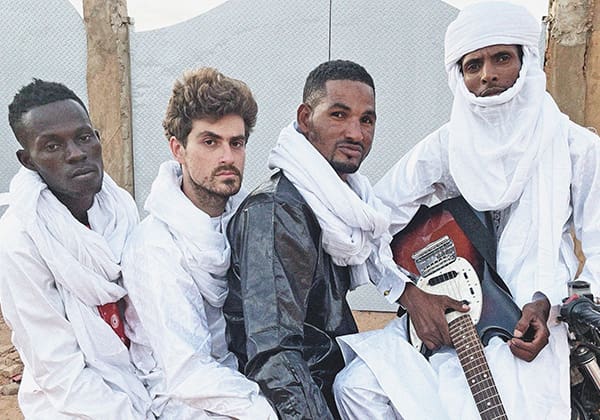The Hendrix of the Desert; the Brad Pitt of Saharan Cinema; Mdou Moctar (and his band) are back with another red-hot studio album. Hailing from a remote village in northern Niger, the actor and songwriter has become famous for trailblazing the electric revival of Tuareg guitar music. Off the success of the cult classic Llana (The Creator), the group’s new work refines their psych-rock repertoire while devoting time to further tend their acoustic roots.
On the world stage, Mdou Moctar represents the Tuareg people of sub-Saharan Africa. The minority ethnic group makes up a fraction of populations across Western and Northern Africa who in recent decades have mounted independence campaigns aimed at creating autonomous governments in rural Niger and Mali. Besides this, the region is noted for the influence of Sufi Islam. The new album draws on this tradition, emphasising Islamic spirituality (one that historically brings association with occult mysticism).
Afrique Victime invites you on an astral projection to the Sahel. With its perfect fusion of bluesy licks and Tuareg flair, the swinging cross-rhythms conjure scenes of a desert convoy, lopsided camel-strides carrying you over ancient dunes. The tempos intensify, the harmonies coalesce to blunt and brutal power chords. How can you not imagine the classic “whirling dervish” while the ecstatic screams of overdriven guitars hammer out 7-minute solos?
If Mdou Moctar’s psychedelic influences shine through here, it takes no stretch of the imagination to see further links to the past. Doesn’t the druggy haze that typifies psych-rock mirror the hashish binges of the Saharan mystic? A robed figure draws back the curtain and you enter a dark tent, smoke hanging thick in the air. At their direction, you recline on sable cushions. As your eyes adjust to the dim light, you are handed an ornate pipe and — hold it right there.
It would be all too easy to get carried away and reproduce the most basic oriental cliches to describe Mdou Moctar. While it hasn’t been explicitly said elsewhere, I think it may be these “esoteric” themes which underlie a lot of the cult-acclaim the band has generated outside their native Sahel. Since 2014, the band has gained significant international acclaim, especially in the hipster republics of the Pacific-Northwest USA. After being scouted by American label Sahel Sounds, the band was joined by Mikey Coltun, the band’s current bassist, manager, and producer, out of Portland, Oregon. It was then that they began, in earnest, to combine rock and Tuareg folk stylings. Mahamadou, the lead singer and architect of the project, has previously commented: “I don’t know what rock is exactly, I have no idea. I only know how to play in my style.”
If they had drifted further down the avenue of Western produced rock, it might have seemed that Mdou Moctar had somehow been musically colonised. But instead, Afrique Victime intentionally develops the band’s traditional sound. Tracks like Ya Habibdti and Tala Tannam lend this album a vital contrast both as musical changes of pace, and as a statement of their inimitable native style. I think it still bears saying that Mdou Moctar may have become successful beyond their home because they touch on a familiar but distant aesthetic in Western audiences. I see this again as a positive, furthering the rich complexity of musical culture. Now signed with indie bastion Matador Records, the group have come armed with another salvo of cross-cultural bangers.
The band writes about the spiritual aspects of Islam and anti-colonial struggles. However, the Sufism of their imagery is not some mystic beard-stroking trope, it is instead a day-to-day spirituality entirely realistic for the band’s rural roots. Tuareg nationalism is no artistic shroud either, with the ethnic group’s contested history running deep. While their modern day struggles are enmeshed in brutal factional conflicts in Libya (notably at odds with the militant Caliphates), Tuareg music has long played an influential role in the politics of the Sahel. Their newest album is an authentic representation of Tuareg culture, but remains accessible to outsiders — language barriers notwithstanding.
Afrique Victime represents the best of all these worlds. There are still the psych-rock fingerprints, but soaked with an unmistakable Tuareg fire. The titular track, written in French and Tamasheq, sings of Mandela, Gadhafi, and a pan-African identity in the face of colonial history: “Africa is a victim of so many crimes/If we stay silent it will be the end of us/Why is this happening?/What is the reason behind this?”
While it’s unlikely to earn them a guest spot at next year’s Eurovision, this music is pure energy. It is powerfully evocative and combines the best elements of the 2010s psych-rock resurgence with some unique and truly impassioned song-writing — a future classic for sure. Fans around the world will be watching the next move of the Tuareg ambassador closely, whether he appears live in Seattle, or on a livestream from Niger, the star of Mdou Moctar will only continue to rise.





